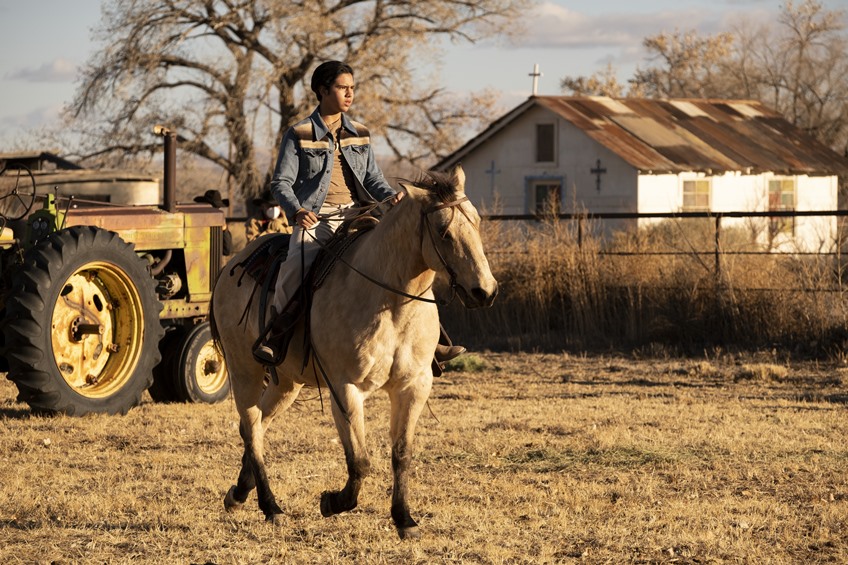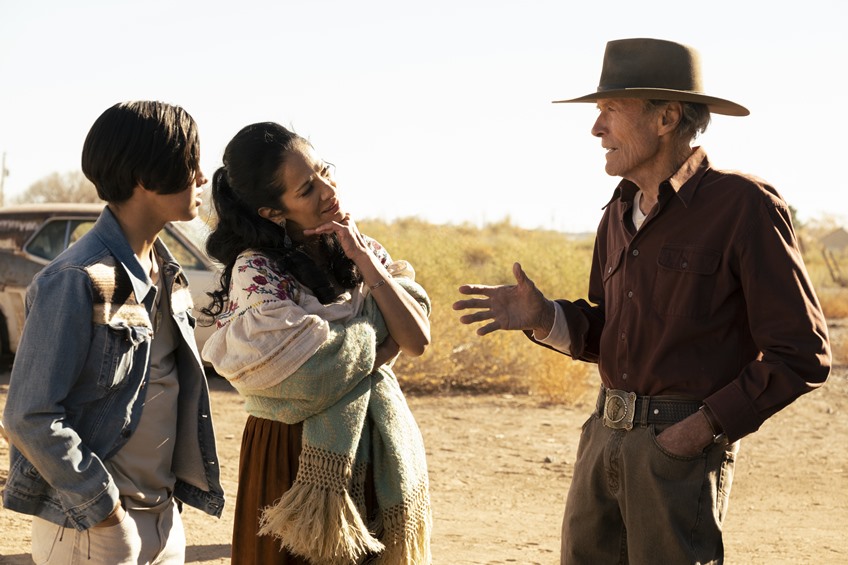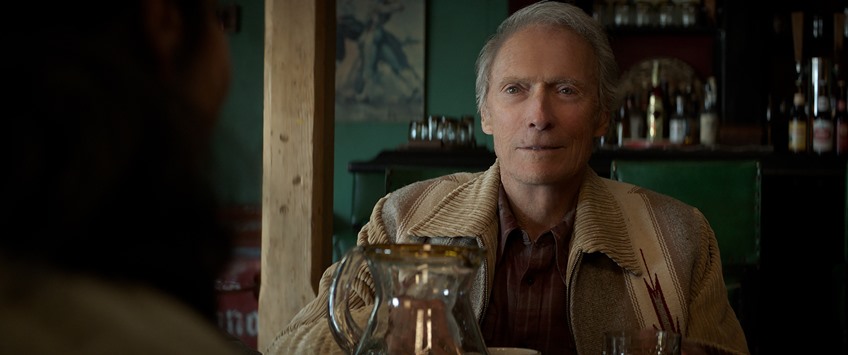Joyce Glasser reviews Cry Macho (November 12, 2021) Cert 12, 104 mins.
Starting with Gran Torino in 2008 when Clint Eastwood was a young seventy-eight, rumours were spreading that this was Eastwood’s last film as an actor. Since Gran Torino was one of Eastwood’s best films as an actor (and director), no one wanted to believe it. Still, Eastwood’s tour de force performance as a macho hero with a soft spot would have been a perfect swan song for his long and celebrated career. While we cannot begrudge a film star with Eastwood’s talent and ageless spirit for putting himself in front of the camera as at age ninety-one, we can wish that he had done so with a better script and co-star.
A caption reads “1979”, as we see former rodeo megastar Mike Milo (Eastwood) drive his pick-up to a horse ranch where (in a tuft of expository dialogue), he learns he has been sacked for being late once again, and not caring. A year later, ex-boss Howard Polk (Dwight Yoakam) awaits Mike in his grace-and-favour bungalow on the ranch to tell him it is payback time.
Howard wants Mike to go to Mexico City where his 13-year-old son Rafael or “Rafo” (Eduardo Minnett) has been living with his abusive former wife and bring him back to Texas. Howard explains he cannot go to Mexico because of legal entanglements. We learn about these later when Mike realises both parents are using the kid as a bargaining chip.

When Mike protests that it would be kidnapping for him to take the child, we learn that Mike owes Howard. After Mike broke his back in a rodeo accident (we see footage of a horse landing on a rider) and his wife and child were killed in a car accident, Howard Polk saved Mike with a job, and free room and board at his ranch. Armed with an old photo of Rafo and a thick ward of cash, Mike drives to Mexico.
Mike quickly tracks down the dissolute ex-wife (Fernanda Urrejola), who tells him she does not know where the kid is. He is not an innocent, but a guttersnipe, dabbling in illegal activities. You can see why Rafo prefers to spend time in the street. Mummy, who dresses like a madam in a brothel, dismisses her two henchmen and tries to lure Mike into the sac, outraged when he rejects her invitation. It is a ridiculous scene. Urrejola is a viper, but she is pretty and 40-years-old. Mike, though his gravelly voice is sexy, and his pallid face still handsome with its smirk and a twinkle in his eyes, walks stiffly with a laboured gait, and is ninety-one.
The rest of the film, adapted by N Richard Nash and Gran Torino writer Nick Schenk from Nash’s novel, is a familiar road movie. Mike finds Rafo in a cockfight and entices him back to Texas with the promise of his dad’s horse ranch. Rafo dreams of learning to ride to impress the dad who rejected him. But mummy dearest is not about to let her son go, and Rafo and Mike have to outwit and, in one scene, out punch her thugs who are in hot pursuit. Yes, Mike might be an old geezer, but he can still pull the ladies, drive a car like Vin Diesel, and knock out a man half his age.
Love is in the air, too, which was not always the case in Clint Eastwood Westerns. Eastwood played lonesome cowboys, sometimes with the death of a family or army buddy to avenge, whose existential mystique did not allow for settling down. When their car breaks down in nowheresville, a savvy Mexican widow named Marta (Natalia Traven), who just happens to own a restaurant, falls for the old man and aims to win his heart through his stomach. And it just so happens that there is a roomy bedroom behind the restaurant where Mike and Rafo can sleep.

Though Marta is about forty years Mike’s junior, their relationship is made more credible by its practical nature, although you have to intuit this point. Single, like Mike, there are no eligible men for Marta in the tiny village, and she is saddled with the care of her cute nieces, whose parents – in another bit of lazy writing – died in a car accident just like Mike’s family. While Mike is not rich, he is a Gringo and that means he has a US passport. More immediately, and by another coincidence, he lands a job next door to the restaurant training wild horses for sale. This is Mike’s dream job and Marta is a strong, but flexible woman, so this mature relationship rings true.
There are echoes of The Bridges of Madison County in the scenes where Mike and Marta slow dance in her dining room as night falls. Eastwood fans will feel the pull of nostalgia as here, as he no longer towers over the lonely woman but bends over her, to lean on her shoulders. In Bridges, Eastwood drives off, but here we get the feeling he is going to turn his car around and finally rest his weary bones.
You might be thinking that 1979 is an odd year in which to set a film, even if the writers want to eliminate post Trumpian Mexican border crossings, the internet and mobile phones. But what I have not mentioned is that the eponymous Macho is an animal – Rafo’s cock fighting champion. He is enough of a hero to bond with Mike in this genre-blending neo-Western, buddy road movie
In Cry Macho, Mike, a horse whisperer, is an animal magician, curing sick animals for the locals in the village where he and Rafo meet Marta. In 1978, Eastwood, a real-life animal lover, had so much fun acting opposite an orangutan in Any Which Way but Loose, that he made a sequel in 1980, Any Which Way You Can.
Rafo, growing up in the streets of Mexico City, strives for a macho image and his pet is a badge of honour. Rodeo riders are macho, too, and for that Rafo reveres Mike. But later in the film Mike tells the boy, ‘The macho thing is overrated.’ This sounds to the audience like Clint Eastwood looking back at his career as one of the most macho of film stars with older, wiser eyes as his character reflects on the emptiness of a life falling off bucking horses.
The film’s major problem is the young actor Eduardo Minnett, who is no match for Clint. He fails to convince as a street urchin or earn our sympathy as a mixed-up kid with serious parental issues, and he lacks the charisma that Eastwood still exudes. Eastwood is a great classical filmmaker, and without any CGI or violence, he tells a pleasing tale that my septuagenarian companion adored. But this is minor fare in the huge Eastwood canon. Let’s hope the man has at least one more film in him: something more original and memorable.




